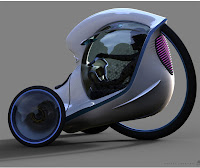
Citroen has released today the renderings of the new Citroen Antistatic Concept, or E-3POD, The project was jointly sponsored by Citroën and EXA, a France-based aerodynamicsimulation software company.
The best overall design was Heikki Juvonen's Citroen E 3POD Antistatic electric tripod which is a single seater vehicle features two small wheels at the front and a large third wheel with an innovative hub-less design. The Citroen E 3POD Antistatic electric tripod is positioned between bikes and cars in the micro segment, and is intended to enhance urban mobility as an addition to the family transportation fleet.
The designer Heikki Juvonen, receives a six month employment contract to work at the prestigious PSA Design Centre in Paris.




Press Release
A series of visionary designs in a Citroën sponsored project have been unveiled at the Royal College of Art’s Interim Degree Show in London. The Double Challenge project required RCA MA second year students to design a compelling ultra-compact model that could establish a unique Citroën e-vehicle aesthetic for the future. The project was jointly sponsored by Citroën and EXA, a France-based aerodynamic simulation software company.
Heikki Juvonen’s E-3POD Antistatic was chosen as the best overall design by representatives from Citroën’s Style Centre and Electric Vehicle Development Team. His single-seat creation is a bold and engaging take on an urban three wheel electric vehicle. The distinctive, aerodynamic styling features two smaller wheels at the front with the driver sitting inside a larger third wheel with an innovative hub-less design. As his prize, Heikki receives a six month employment contract to work at the prestigious PSA Design Centre in Paris.
Heikki commented; “I’m thrilled Citroën selected my design as their favourite and I can’t wait to work with their talented team in France. As a designer I strive for new and better solutions. Good and sustainable design not only improves manufacturer brand image and sales, but can also help to preserve our environment.”
Citroën had significant involvement throughout the Double Challenge project, providing industry figures to lend the students their expertise and experience, as well as organising a trip to the PSA Design Centre and Le Conservatoire, Citroën’s in-house museum of historic models.
Philippe Holland, Responsable Style Graphique at Citroën, said; “We’re delighted to be involved in this important RCA project. The students have produced some truly exceptional ideas for the future design of electric Citroën vehicles. This type of powertrain is increasingly recognised as an important solution for economically and environmentally viable urban transport; so it’s fantastic to see the electric visions of these potential car designers of tomorrow.”
The RCA is the only exclusively postgraduate art and design university. The college’s Automotive Design course has been in existence for 40 years and is the oldest of its kind in Europe.
Mark Lloyd, Chief Designer of the award-winning Citroen DS3, previously studied at the Royal College of Art.
Designed by RCA student Heikki Juvonen, the Citroën E-3POD Antistatic electric tripod is a new type of electric vehicle for urban commuting. The ultra-light, micro segment, single-seater is not meant to replace cars, but to be an addition to the family transportation fleet, positioned between bikes and cars. With the E-3POD, the user can enter the world of electric vehicles without having to sacrifice their main means of long distance travel in internal combustion engine cars. The distinctive look of the electric design language is applied to distinguish the product from being associated to cars, for the avoidance of comparison in terms of operational range or refuelling/recharging time. The E-3POD has a simplified, lightweight construction with an emphasis on aerodynamics to minimize the required battery size. This lowers the production costs, making the E-3POD affordable for purchase in addition to the family car - and a potential means of commuting for young people and students. The lowered weight is emphasized in design elements such as the rear wheel, which works as a supportive structural element, the shared suspension for both front wheels, and the use of scratch resistant plastic for the canopy. The silent electric engines also make sound insulation redundant, allowing for lighter material selection. The E-3POD provides the user with easy, cost efficient transport with access to easier parking due to the small footprint. The design also provides comfortable and isolated personal space, which - when compared to bicycles or public transport - is a welcome addition. The short length of the vehicle makes it agile in urban environments. At higher speeds the E-3POD tilts slightly to provide solid grip and an emphasised stance, giving cornering a more responsive feel.
No comments:
Post a Comment